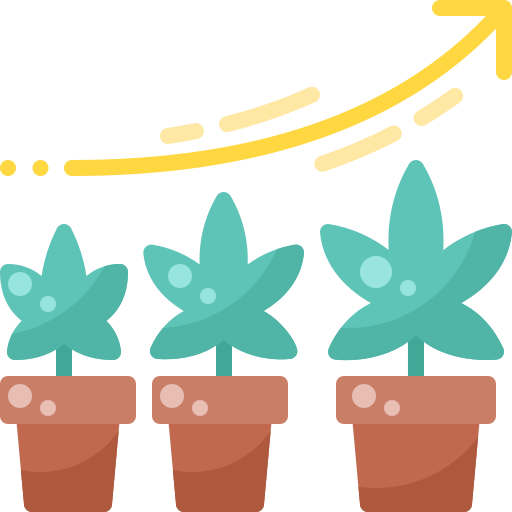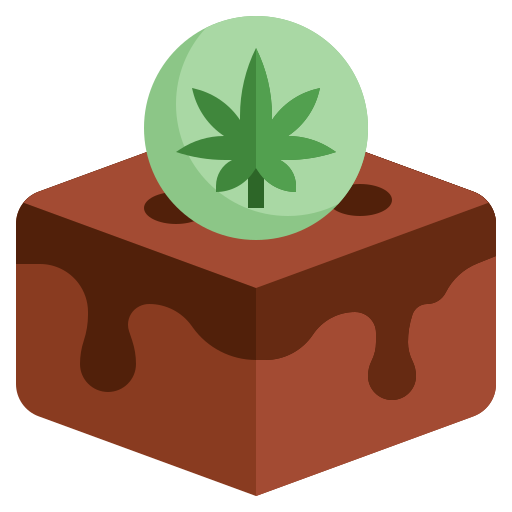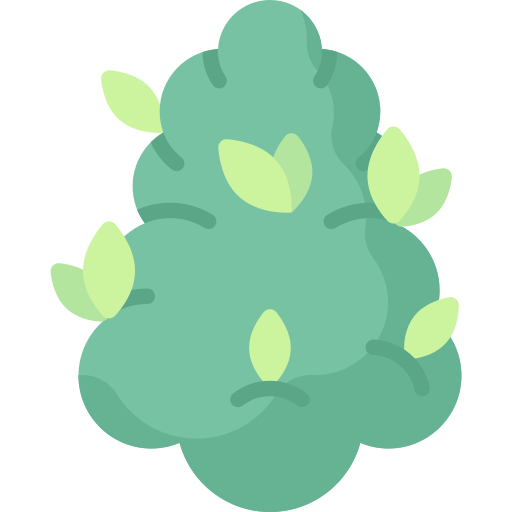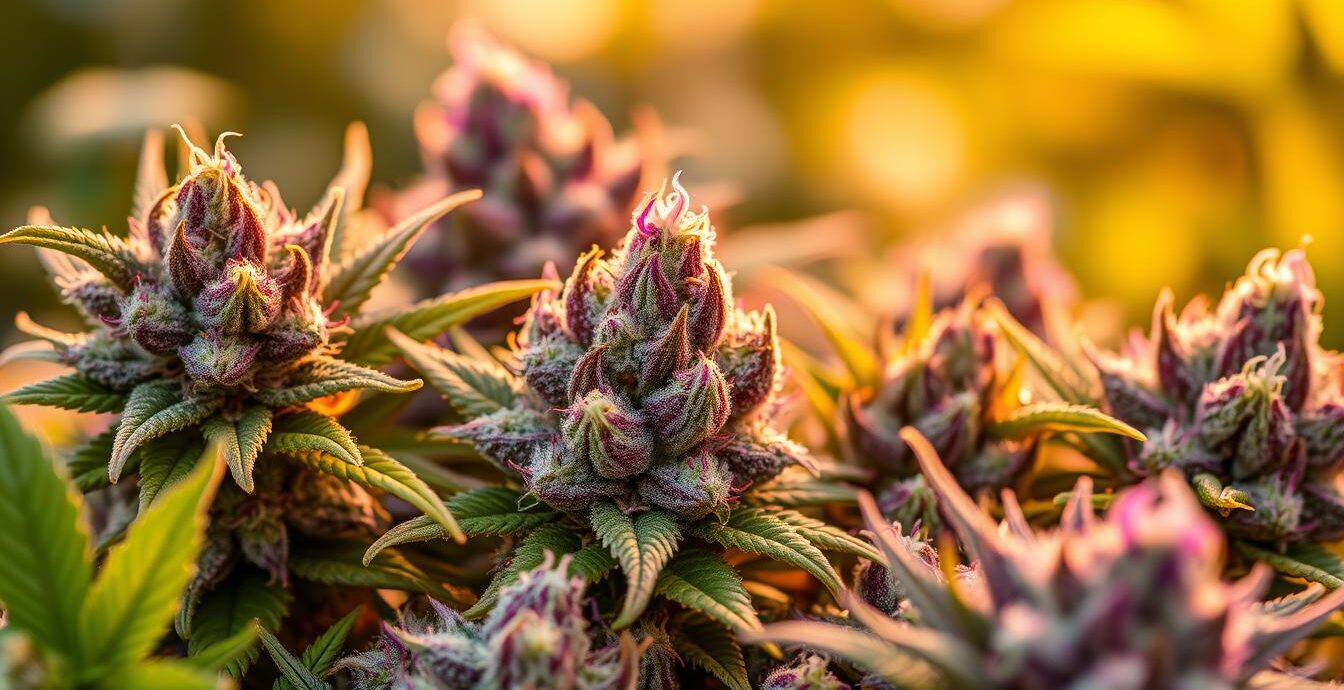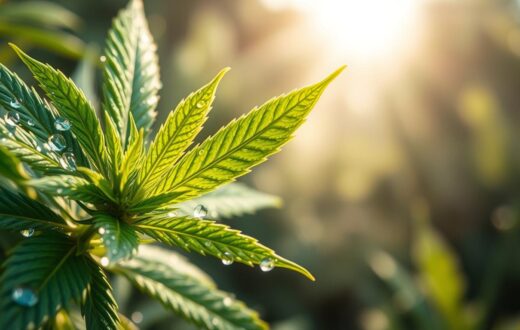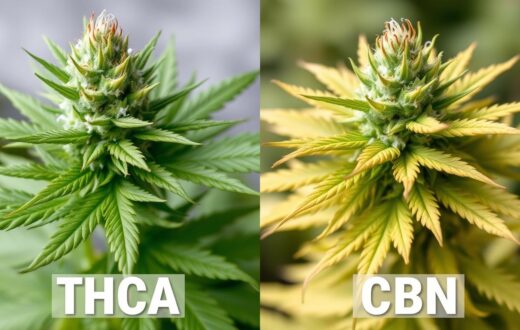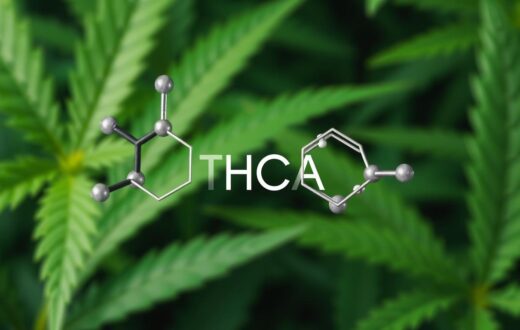Ever wondered why some cannabis fans are excited about THCA strains? These high-THCA hemp flowers are changing the game. They offer a unique experience for those looking for raw cannabis benefits. Let’s explore the world of tetrahydrocannabinolic acid and see why it’s popular.
THCA strains are big in the cannabis world, especially in places with strict rules. These hemp plants are bred to have lots of THCA. This acid stays non-psychoactive until it’s heated. It’s like finding a hidden treasure.
Some THCA strains are really making a splash. White Widow has 33.9% THCA, and Ice Cream Cookies has 19-21%. Cereal Milk and Jealousy also stand out with 28.3% and 24% THCA. These strains offer a range of effects, from happiness to deep relaxation and creativity boosts.
Quality is key when it comes to THCA flower products. Companies like Arete, Apollo, Lucky Elk, and Bay Smokes are at the forefront. They offer excellent options for those interested in this exciting part of the cannabis world. Whether you’re a seasoned fan or new, there’s a THCA strain for you to try.
What Are THCA Strains?
THCA strains are special types of unheated cannabis plants. These plants are grown to have high levels of tetrahydrocannabinolic acid, or THCA. This compound is found in raw cannabis and is different from the THC we often hear about.
Understanding THCA
THCA is one of the acidic cannabinoids found in fresh cannabis. Unlike THC, THCA doesn’t make you feel high. Many THCA strains have high levels of this compound. For example, Arete’s White Widow has a THCA potency of 33.9%. Other strains like Gary Payton by The Green Dragon CBD and Lucky Elk’s Cereal Milk have THCA levels of 28.7% and 28.3% respectively.
Differences Between THCA and THC
The main difference between THCA and THC is how they affect you. THCA doesn’t make you feel high, but THC does. When you heat THCA, it turns into THC. This happens when you smoke or vape thc-a cannabis. Some people use THCA for its potential benefits without the high. Research suggests THCA might help with inflammation, nausea, and pain. It’s important to note that these effects are still being studied.
Benefits of THCA Strains
THCA strains have many benefits for those looking for medicinal cannabis. They are non-psychoactive, meaning they don’t get you high. This makes them great for using during the day or when you don’t want to feel impaired.
Therapeutic Benefits
Research shows THCA can help with many health issues. People say it helps with chronic pain, anxiety, and insomnia. It also helps with nausea, which is good news for those going through chemotherapy.
Potential Anti-Inflammatory Effects
THCA might help with inflammation too. Studies suggest it could help the body fight off inflammatory conditions. This is good news for people with arthritis or other inflammatory diseases.
Neuroprotective Properties
A 2017 study found THCA is very good at protecting the brain. This means it could help with neurodegenerative diseases. As research goes on, THCA’s role in keeping brain cells healthy and supporting thinking skills is getting more attention.
Popular THCA Strains
High-THCA cannabis strains are popular among those looking for unique experiences. They offer different effects and flavors. This makes them a favorite in the hemp world.
A Look at Cannatonic
Cannatonic is a standout among hemp varieties. It has a high CBD:THC ratio, appealing to those seeking medicinal benefits. With THCA levels between 18% and 22%, it provides a balanced experience.
Exploring Harle-Tsu
Harle-Tsu is a hybrid strain that’s caught the attention of THCA enthusiasts. It’s known for its balanced effects and may help with pain. Its THCA content can reach up to 22%, making it quite potent.
Notable Characteristics of Acapulco Gold
Acapulco Gold is a classic sativa strain that’s back in the high-THCA scene. It’s known for its golden color and uplifting effects. With THCA levels often over 20%, it offers a strong experience.
The market for THCA flowers is growing fast. With over 40 strains available, prices start at $25.99. THCA content ranges from 19% to 29%. There’s a wide variety to choose from, whether you prefer indica-dominant hybrids or sativa-leaning strains.
How to Consume THCA Strains
THCA strains come in many forms to fit everyone’s taste. You can pick the method that works best for you. This way, you can enjoy the effects in your own way.
Tinctures and Oils
THCA tinctures and oils are great for precise dosing. They last a long time and are easy to use. You can take them under your tongue or mix them into food and drinks.
Edibles Options
THCA edibles are a favorite among many. You can find them as gummies, chocolates, or baked goods. They’re tasty and give effects that last for hours.
Smoking and Vaping Methods
Smoking and vaping THCA flower are traditional choices. They work fast. Vaping doesn’t burn the flower, which might be better for you. Smoking is familiar for many.
Each method changes how THCA turns into THC. This affects your experience. Start small, especially if you’re new. Adjust as you see fit.
Growing THCA Strains
To grow THCA strains, you need the right conditions. This applies to both hemp farming and growing cannabis for THCA. Let’s look at the basics of growing these special strains.
Ideal Growing Conditions
THCA strains do best in controlled environments. During the flowering stage, keep daytime temperatures between 75-85°F. At night, they should be 10-15 degrees cooler. Humidity should be 40-50% to avoid mold and increase resin.
Nutrients Needed
Healthy plants make more cannabinoids, including THCA. It’s important to balance nutrients throughout growth. Too much water can harm the roots, while too little stresses the plant and lowers THCA.
Remember, THCA turns into THC when heated.
Common Pests and Issues
Be on the lookout for spider mites and powdery mildew. Regular checks can catch problems early. When harvesting, handle plants carefully to keep trichomes intact.
Look for clear or milky white trichomes for high THCA levels. After harvesting, cure buds in airtight containers. Open them now and then to prevent mold and keep quality high.
Research and Studies on THCA
Recent studies have uncovered the potential benefits of THCA. This compound is found in fresh cannabis plants. It has caught the attention of scientists and medical professionals.
Research has shown that THCA may have anti-inflammatory, anti-nausea, and anti-seizure effects. It could also offer neuroprotective properties and help with metabolic syndrome. These findings have sparked further interest in its therapeutic uses.
Experts’ Insights
Experts say we need more clinical trials to fully understand THCA. A study in the Journal of Cannabis Research looked at hemp’s gene expression. It found that CBDA synthase was much higher than THCA synthase.
This could lead to new ways to produce and use THCA. But experts also warn about potential risks. These include unregulated products, contamination, and varying potency levels.
As research continues, we’ll learn more about THCA’s benefits and limitations.
Legal Status of THCA Strains
The laws about THCA strains are complex. The 2018 Farm Bill made hemp products legal at the federal level. This includes THCA strains with less than 0.3% delta-9 THC.
Federal Regulations
THCA products are legal federally if they have less than 0.3% THC. In May 2024, the DEA clarified THCA’s legal status. It’s non-psychoactive until heated, turning into THC.
The Farm Bill’s definition of hemp has led to more THCA products in the U.S.
State Variances
State laws on cannabis vary a lot. Some states have stricter rules than federal laws. For example, Pennsylvania has strict rules on hemp-derived cannabinoids.
Texas recently banned THCA flower sales. But, California and Colorado allow THCA flower sales, following federal law.
The laws on THCA are changing. Buyers should check local laws before buying THCA products. Some states consider ‘total THC’ by adding THC and THCA conversion. This affects product legality in different places.
The Future of THCA Strains
The cannabis industry is looking up for THCA strains. We’re seeing new developments in cannabinoids that could change the game. In 2023, THCA sales reached $200 million, making up 7.3% of hemp product sales. This shows more people are interested in THCA’s special qualities.
Emerging Trends
Consumer tastes are changing. Delta-8 THC is still popular, but THCA is gaining ground. Stores in North Carolina and Texas are now selling THCA flower legally. This trend is expected to grow as more people discover THCA’s benefits.
Potential Developments
THCA’s future in cannabinoids is bright. Studies are finding it has anti-inflammatory and neuroprotective effects. This could lead to new medical uses. Also, growing techniques are getting better, making THCA strains more flavorful and potent.
Companies like Hyperwolf Direct are leading the way in quality. They focus on the right mix of cannabinoids and terpenes. As the industry grows, we’ll see more creative strains and products. The future of THCA is about more than just strength. It’s about finding the right effects and making products sustainably.
How to Identify Quality THCA Strains
Finding the best THCA strains requires careful attention and knowledge. Quality starts with lab tests. Top brands test their products thoroughly to ensure they are safe and strong. When looking for THCA flower, choose strains that have been well-tested.
Lab Testing and Transparency
Quality THCA strains have proof. Reliable companies share Certificates of Analysis (CoA) for their products. These show the THCA content, terpene profiles, and contaminant screenings.
For instance, a top strain might have 25-30% THCA. Like Lemon Cherry Gelato Flowers by Koi, which has 25% THCA.
Reading Labels and Certificates
Understanding labels and certificates is crucial for finding premium THCA strains. Look for information on cannabinoid percentages, terpene profiles, and how it was grown. Organic growth often means higher quality.
Check if the potency is consistent across batches. For example, Area 52’s Exotic Flower keeps a strong 30% THCA content. Also, make sure the THC level is under 0.3% as required by law. This is shown through product testing results.
Comparing THCA and CBD Strains
Cannabis plants have many compounds, like THCA and CBD. These two have different uses and properties. Let’s look at the differences to help you choose wisely.
Similarities and Differences
THCA and CBD share some qualities. Both are not psychoactive when raw. CBD stays non-intoxicating, but THCA can become psychoactive when heated.
THCA strains can offer psychoactive effects. CBD is used for anxiety and pain relief without getting high. THCA also offers similar benefits but can cause a high if heated.
When to Use Each Type
Choose CBD strains for therapeutic effects without a high. They’re good for daytime use or if you’re sensitive to THC. THCA strains are best if you want psychoactive effects.
They’re great for those who enjoy the full cannabis experience. When comparing CBD and THCA, think about your goals and comfort with cannabis.
Both types are available in oils, edibles, and flowers. Start with a low dose to see how you react. Remember, laws about these compounds vary by place. Always buy from trusted sources with lab test results.
This ensures you get a safe, quality product that meets your needs.
Consumer Experiences with THCA Strains
We’ve collected cannabis user reviews to show you how THCA strains work in real life. These strains are known for their unique benefits and flexibility. Let’s explore what users have to say about their experiences.
User Testimonials
Many users have had positive experiences with THCA strains. They talk about pain relief, better sleep, and less anxiety. One user said, “THCA has changed my life with chronic pain. I can now enjoy my day without pain.”
Another user mentioned improved sleep quality, saying, “I’ve never slept better since using THCA strains.”
Anecdotal Evidence
THCA strains seem to help with many conditions. Users with migraines and PTSD have seen big improvements. One review mentioned, “My migraines have gotten less frequent and less severe since I started using THCA.”
Users also love the flexibility of THCA strains. They can be consumed raw for health benefits or heated for a stronger effect. A user noted, “I enjoy using THCA raw for its health perks or heating it for a more intense experience.”
While everyone’s experience is different, these reviews offer valuable insights into THCA strains’ potential benefits. Always talk to a healthcare professional before trying any new treatment.
Tips for First-Time Users
Starting with THCA strains is exciting but can feel overwhelming. This guide is here to help you understand cannabis dosing and what to expect. THCA, the non-psychoactive form of THC, has its own benefits and needs careful handling.
Starting Dosage
For those new to THCA, start with a small amount. Try 5-10mg of THCA to see how your body reacts. Remember, THCA becomes psychoactive when heated above 220°F. Raw THCA products will have subtle effects without making you feel high.
What to Expect
Raw THCA might help with inflammation or improve focus. Heated THCA products can have different effects based on the strain and your body. Indica strains help you relax, while sativas increase energy. Hybrid strains mix both.
Start in a place where you feel comfortable. Let the effects fully kick in before changing your dose. Keeping a journal of your experiences can help you find the right dose for you. As you get more comfortable with THCA, you can try stronger options. But always remember to stay safe and comfortable.
Conclusion: Choosing the Right THCA Strain
Finding the right THCA strain is a journey that’s all about you. It’s important to think about things like how strong it is, the terpenes it has, and what you want to use it for. Also, remember that THCA hemp flower can’t have more than 0.3% THC by dry weight to follow the rules.
Personal Preferences
Your body chemistry affects how you react to different strains. Some people might like White Widow, while others prefer Cereal Milk or Jealousy. Indoor-grown strains usually have more THCA because of the controlled environment.
When using a THCA product guide, look at the lab results. Many labs now show total THC percentages, including what THCA could turn into. This helps you understand how strong a product is. If you’re vaping, try to keep the temperature between 325°F and 400°F to keep the terpenes and cannabinoids safe.
Also, check the laws in your area. Rules about THCA and THC products can change a lot. By doing your research and talking to experts, you’ll find the perfect THCA strain for you.
